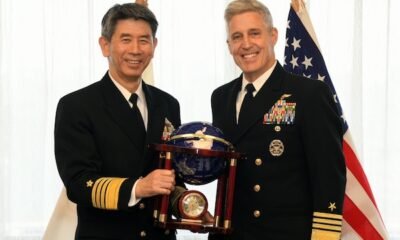All Navy Categories
Stanford and NPS Climate Security Fellows Rise to National Challenge
Rising sea levels and global temperatures, coupled with more severe and frequent weather events such as droughts, floods, and wildfires, are causing extensive damage globally. These phenomena not only affect people and their homes but also threaten national security by damaging infrastructure and the environment.
The U.S. Navy and Marine Corps, operational across all domains, are increasingly affected by climate change. To tackle these growing threats, the Naval Postgraduate School (NPS) and Stanford Doerr School of Sustainability signed an Educational Partnership Agreement in December 2022. This collaboration birthed the Climate Security Fellowship program, aimed at developing new solutions for the Navy’s and Marine Corps’ operational threats caused by climate change.
The inaugural cohort consisted of 12 graduate and postdoctoral students from NPS and Stanford. These “Climate Security Fellows” brought diverse educational backgrounds and real-world experiences to the program, ranging from infrastructure defense and national security affairs to electrical engineering and sustainable design.
Applications are now open for the next cohort, which will expand to 20 students. The program will also welcome new institutional partners, including George Washington University and the Naval War College. Concurrently, the Army War College has established an Environmental Security Fellows program to broaden the Department of Defense (DOD) perspectives on climate-related challenges.
Motivated by White House Executive Order No. 14008, which calls for tackling the climate crisis domestically and internationally, the Climate Security Fellowship embodies the mobilized efforts of the DOD, DON, NPS, and Stanford.
Historically, the Department of the Navy (DON) has invested in climate science. During World War II, oceanographer Roger Revelle conducted sonar research for the Navy’s Bureau of Ships. Post-war, his work on greenhouse gas emissions, funded by the Office of Naval Research, led to groundbreaking research on carbon dioxide absorption and the Keeling Curve. This work laid the foundation for the Navy’s ongoing climate-related initiatives.
Understanding and predicting climate impacts on Navy and Marine Corps operations are critical. Secretary of the Navy Carlos Del Toro, an NPS alumnus, emphasized the urgency in his 2021 strategic guidance, recognizing climate change as a significant global threat potentially leading to increased conflicts.
In response, NPS established the Climate Security Network (CSN) to foster collaboration and information sharing to mitigate climate threats. Kristen Fletcher, who co-founded CSN, stated that the network aims to address DOD and DON goals of building climate resilience.
The Stanford Doerr School of Sustainability, founded in September 2022, partnered with NPS to focus on collaborative efforts in ocean sciences, energy security, and climate sustainability. A significant event in this collaboration was the Navy’s second Climate Tabletop Exercise held in April 2023, concentrating on energy, water security, and coastal resilience.
The first cohort of Climate Security Fellows initiated their projects in November 2023. They tackled various climate change issues through research and innovative approaches, supported by advisors from NPS and Stanford. The fellows produced detailed reports on subjects ranging from naval base resilience to food and water security in Southeast Asia.
For instance, U.S. Navy Lt. Caroline Kelly, passionate about climate issues, saw the fellowship as an intersection between her professional work in meteorology and oceanography and the broader implications of climate change. Stanford postdoctoral student DeVant’e Dawson, focusing on heat-tolerant corals, viewed the fellowship as an opportunity to align scientific research with policy implications.
The fellowship’s collaborative nature has been instrumental in integrating military and civilian perspectives, which U.S. Navy Lt. Dishan Romine finds essential for operational readiness. The data analytics provided through their research help military leadership make informed decisions to ensure continuous operations even under climate stress.
The partnership between NPS and Stanford Doerr School of Sustainability is proving to be a formidable force in addressing climate security. With climate change posing serious readiness challenges, the Climate Security Fellows are expected to play a crucial role in developing practical solutions for Navy and Marine Corps operations.
As Del Toro remarked, climate change remains one of the most destabilizing global forces today. The combined expertise of NPS and Stanford promises impactful solutions that can be implemented both now and in the future, marking a significant stride in combatting climate-related threats to national security.







